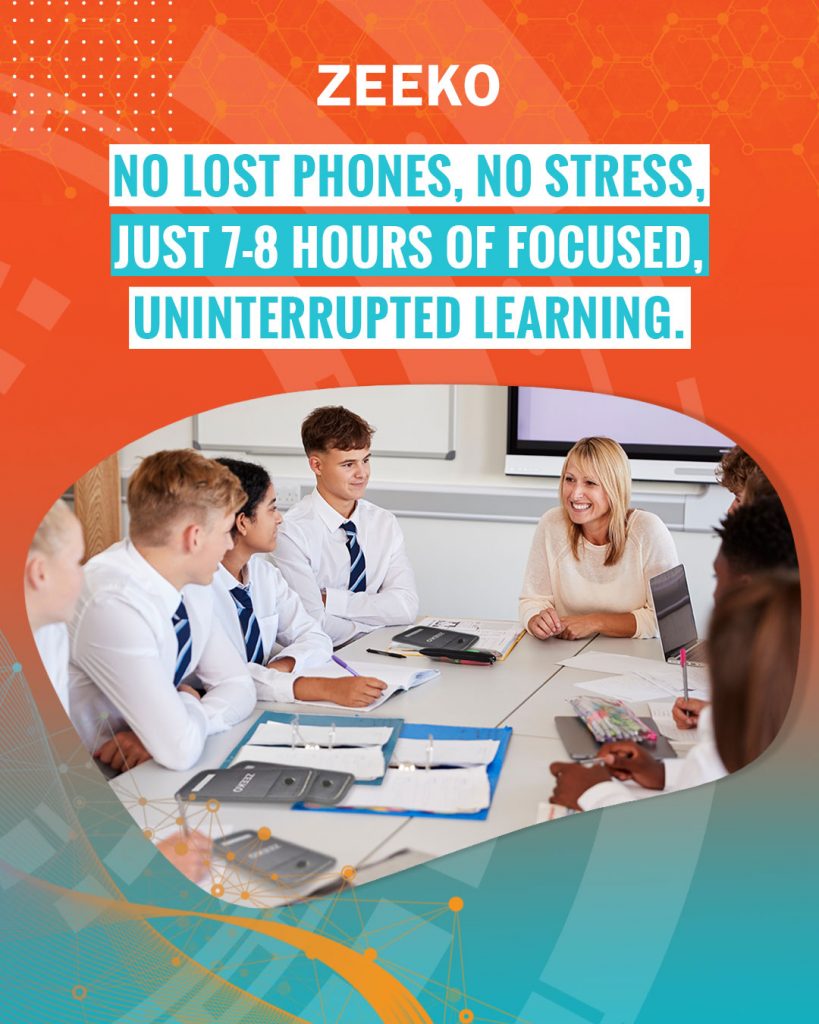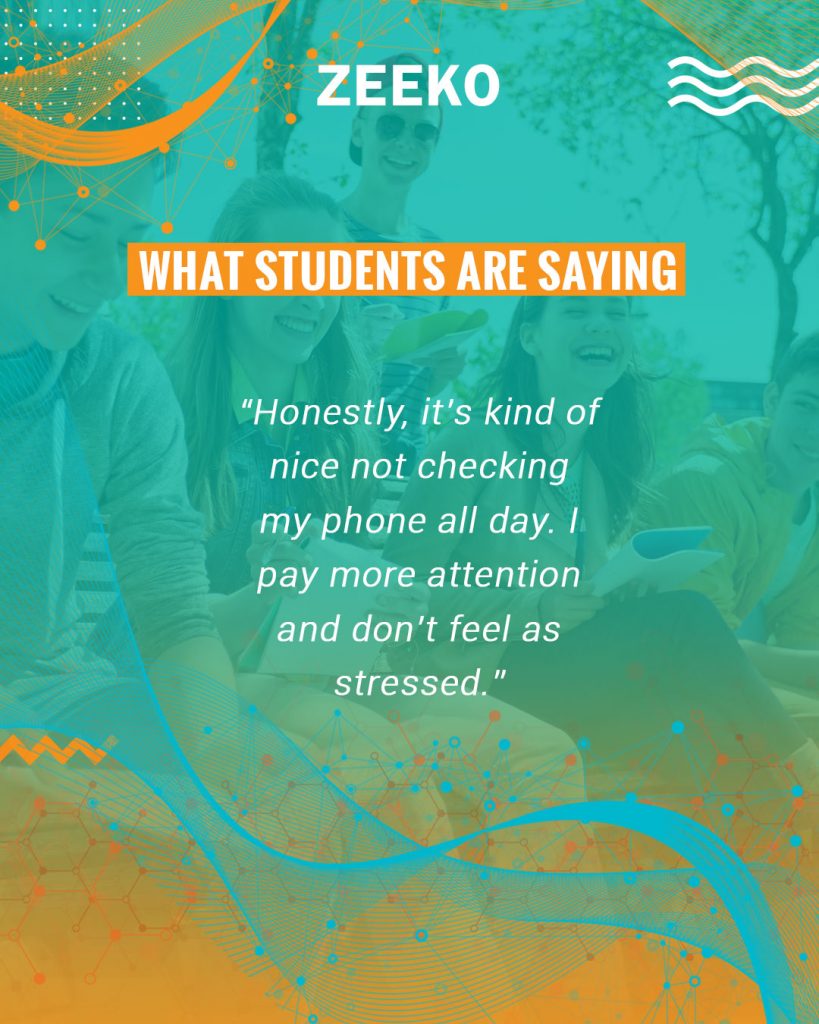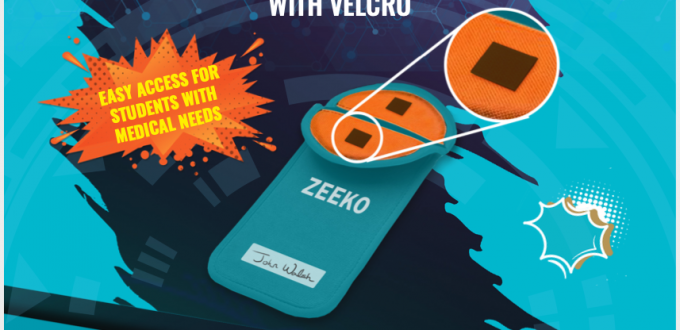Phone Pouches allowing Secondary school students to enjoy their 8 hour break
An Interview with an Irish Secondary School Deputy Principal.
One of the biggest distractions to learning in Irish Schools is smartphones, disrupting both teaching and learning. Constant notifications, social media, and gaming apps pull students' attention away from lessons, diminishing focus and academic performance. Phone Pouches Give Students 8-Hour Phone Breaks, the temptation to check phones during class leads to multitasking, which is not only a distraction to the student but also the students around them. Additionally, smartphones contribute to classroom disruptions as students may text, take photos, or engage in online activities, often bullying. Excessive phone use can cause social isolation and cyberbullying, affecting emotional well-being. Teachers and school staff often struggle to maintain control and engagement when competing with technology in the classroom and the bottom line is, there should be no competition.

Phone Pouches
In recent weeks, you may have heard more and more talk in the media about ‘phone pouches’ that have begun to be introduced in Irish schools. Phone pouches are often lockable or sealable, and are designed to store students' phones securely, promoting focus and reducing distractions in the classroom. Phone Pouches Give Students 8-Hour Phone Breaks, the initiative reflects a growing recognition of the potential negative impacts of smartphones on education, including but not limited to reduced attention spans, cyberbullying, and overdependence on technology.
The implementation of phone pouches aims to strike a balance between fostering academic discipline and addressing parental concerns about safety. Students hand over their devices upon arrival or seal them in the pouch, which is only unlocked at the end of the day or during designated times. This approach preserves a structured learning environment while allowing access to phones outside of school hours.
We spoke to an Irish Secondary School Deputy Principal
We recently spoke to an Irish Secondary School Deputy Principal who in August led the introduction of phone pouches in their school of over 800 students. It was a pleasure and indeed extremely insightful to learn about the thought process behind the initiative, how it was received by parents, students and staff in this school. Here is how our conversation went.
Part 1: The motivation and the reaction.
We asked this Deputy Principal what was the motivation behind beginning this initiative in the first place, their response;
“The level of distraction for students. Despite the countless boundaries and rules our school had in place having mobile phones in school, the students were not complying. They physically were not able to not be distracted. As soon as the teacher would turn their backs to the board, they would stop listening and discreetly try to check their phones under the table. Our goal was simply to create a distraction free environment for learning and to limit access to smartphones during school hours.”
We asked what were the challenges in the initial stages and how were the pouches received?
“Yes of course there were challenges, there always is when it comes to change. We found that the majority of the parents were very supportive but some parents were very apprehensive about it. The main fear was that they would not be able to contact their child during the school day.”
“With our students, the majority understood the initiative. We placed huge emphasis around our ‘why’ we were doing this and made it absolutely crystal clear. Our reason was to help our students, it was not a punishment, it was to create a distraction free environment for learning. Understandably, a very small minority were not happy. We sent an info doc around the phone pouch initiative to each household, along with FAQ’s in August before the return to school so the students knew what to expect and parents and students could discuss it at home.”
Part 2: The Impact
The second part of the interview focused on the impact that the phone pouch initiative had on students' learning and also on the various relationships that exist within the school community. Firstly, we asked how phone pouches impacted students' learning and academic performance.
“It’s been the single biggest positive change on learning in the classroom again for our school. Teachers have commented that students are now listening in the classroom, their faces are facing up to the top of the classroom. The conversation in the classroom has been better, students are listening to each other. Overall they are notably more engaged and will contribute to discussion in their various subjects.
The social change has been huge. Our corridors are louder, they’re speaking to each other, they are making more friends, which is a massive benefit. Some students have told us they feel safer. Before we made this change, students felt like they were always at risk of having their photograph taken on the sly and it would end up on a social media platform. The FOMO for students in not responding to their peers has been removed, they are all in it together not being on their phones, so there is no one waiting on responses from them. By all accounts they are more relaxed and actually enjoy their 6-8 hour break.
From a staff perspective, we have fewer year heads looking for social groups to help students make friends, they are now making friends organically. It’s given them more opportunities to make friends. They are talking and actually getting to know each other. There is a calmer atmosphere overall in the school and in the canteen. Previously, if there was a fight or an argument in the school between students, it could often have ended up on the internet and social media before the school was even aware it had happened. It’s given staff the opportunity to do their jobs and manage these situations with no outside noise.
Students attendance has improved, we have eliminated the avenue of students constantly texting home to be allowed leave. Parents have even stated that they feel less stress now there is no constant nagging to come home.”
We then spoke about the changes that have been experienced between students and staff. Here is the response;
“By removing phones from the picture, we have significantly reduced arguments between students and staff. There’s less aggravation daily. Teachers and staff don’t have to ask students to hand over their phones and in general most relationships have gotten stronger. This could be because our staff have and use pouches as well, they have velcro pouches so there is a standard.”

Part 3: Advice for other Irish Schools
Part 3 focused on this Deputy Principal’s opinion on the smartphone ban in Irish schools and their advice for other schools who are thinking about implementing the phone pouches initiative. Phone Pouches Give Students 8-Hour Phone Breaks, this was their response to the smartphone ban;
“The smartphone ban in schools is not realistic. Nearly every school has a ban on smartphones and are still most likely experiencing the same problems our school experienced. It’s not feasible. Every school needs to have autonomy; they know what will best suit their school best.”
We then asked for their advice for other schools who are thinking about introducing this new initiative, here is their advice;
“Plan for every possible eventuality and excuse from your students. Be very clear on your policy and boundaries. Your initial messaging is vital. Be very clear on your why, it’s for them to help them and create a distraction free environment for their learning. Keep the narrative as positive as you can, remind students that it’s not a punishment, it's to help them.”
Part 4: Advice for Parents
Finally, we asked this Deputy Principal’s for advice for parents around their child’s smartphones and if they had any insight into how phone usage at home can affect their performance in school. Here is the feedback they gave us;
“There are a couple of key issues related to smartphone usage that I have found parents are not tuned into:
- Late-Night Screen Time: Parents are not aware of the extent of their child's phone usage and screentime, especially in their bedrooms at night. They can be active on their phones and awake until 4am. Parents are often then wondering why their child can’t get up in the morning for school. Phones should be removed from children before they go to bed.
- Snapchat and FOMO: Snapchat is a massive problem in creating FOMO for children and they are in constant contact until all hours of the morning. Sleep and lack of sleep is the biggest impact on school life and being able to effectively participate in school.
- The social media algorithms, the continuous reinforcement of inappropriate trends, TikTok's videos reinforcing a child’s self doubt. Self doubt, self harming, eating disorders are the biggest issues that I witness in schools that are fuelled by social media. Anorexia cases are just as high now as they were in the 90’s.
- Students both male and female, are so focused on appearance. The quantity of photos they take of themselves. It’s sad to see so many young people always looking inward. What’s even sadder, is it’s all down to a device.
- I’ve seen a big decline in children's empathy. In the last 4 years, what they are willing to say to each other face to face now, I would have never expected.
- Parents often come into the school wondering why their child can’t get up in the morning, why their grades are slipping and why they are constantly distracted, the answer which they often don’t believe is smartphones. I often think, if there is something wrong with your car, you’ll listen to your mechanic, but when it comes to students we are hesitant to listen to teachers."
Conclusion
The phone pouch initiative has a transformative impact on students, teachers, and parents, making a compelling case for its adoption in Irish secondary schools. By tackling the pervasive distraction of smartphones, schools can create more engaging, inclusive, and focused environments that improve academic success and social development. The insights shared by the teacher underline the importance of clarity, communication, and consistency in implementing such initiatives.
Smartphone misuse extends beyond the classroom, affecting students’ emotional well-being and social interactions. The teacher’s advice for schools and parents underscores the need for a collaborative approach to managing smartphone usage both in school and at home. With thoughtful planning and a clear rationale, schools can empower students to thrive academically and socially while mitigating the challenges posed by technology.
Ultimately, the success of initiatives like phone pouches lies in a shared commitment to prioritising students' growth, well-being, and future readiness in an increasingly digital world. Follow Zeeko Education on Facebook!

